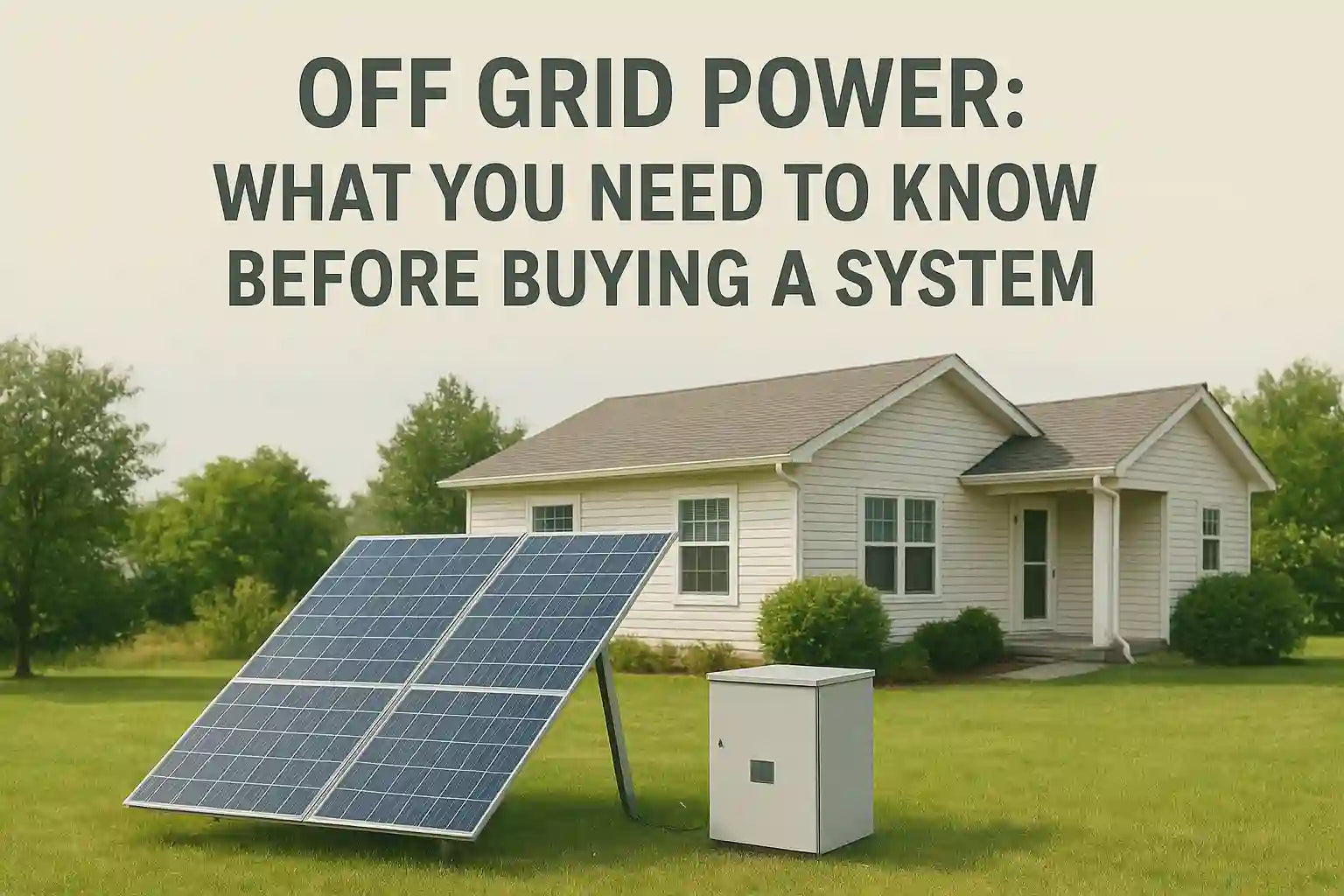
Off Grid Power UK: 7 Things You Need to Know Before Buying a System
Thinking about switching to off-grid power UK? This guide explains the basics for anyone starting their energy journey.
What Is Off-Grid Power?
Off-grid power means producing your own electricity without being connected to the national grid. You're fully self-reliant. This is different from grid-tied systems that still depend on external electricity. Off-grid systems must supply 100% of your energy.

Why People Choose Off-Grid Power UK Solutions
Alternative energy systems are becoming more popular as electricity prices rise and people seek energy independence. Rural homeowners often lack access to the national grid. Others are looking for sustainable or backup solutions. These setups provide greater flexibility and control. In emergencies, they keep essential appliances running. They’re also well-suited for cabins, farms, and eco-homes across the UK.
Off Grid Basics: Understanding How It All Works
To build an off-grid system, you must understand off grid basics. Every setup includes three key parts:
Your system begins with energy generation, which may come from solar panels, wind turbines, or small-scale hydro. Next is energy storage, where batteries hold excess power for use during the night or poor weather. Finally, conversion and control components like inverters and charge controllers ensure your electricity is safe and usable.
You generate energy, store it, and then convert it into usable electricity for your appliances.
Main Components of Off-Grid Systems
Here’s a breakdown of what you’ll need:
- Solar panels: Most common power source in the UK.
- Wind turbines: Great in windy regions, especially during UK winters.
- Batteries: Store energy for use at night or during cloudy days.
- Inverters: Convert stored energy into usable AC power.
- Charge controllers: Prevent batteries from overcharging or discharging.
All components must work together smoothly for stable off-grid power UK performance.
Sizing Your Off-Grid System Correctly
Proper sizing is vital for off-grid success. Follow these steps:
- List all electrical appliances you plan to use.
- Estimate daily and seasonal power use in watt-hours.
- Choose battery capacity based on your peak load and autonomy days.
- Size solar panels to recharge batteries even during cloudy periods.
Oversize the system slightly to allow for growth or bad weather.
Choosing Between Battery Types
You’ll need batteries that match your needs and budget. Here's a quick breakdown:
- Lead-acid: Cheaper, proven tech, but needs maintenance.
- Lithium-ion: More efficient, compact, longer lifespan—but pricier upfront.
- Saltwater or flow: Emerging tech, eco-friendly, but still rare in off-grid power UK setups.
Battery choice affects cost, performance, and maintenance.
Installation, Safety, and UK Regulations
UK installations must meet building and electrical safety standards. Off-grid systems still require compliance. You may need planning permission in some areas. Always consult a qualified installer or electrician. Safety tip: Install surge protectors, fuses, and grounding to avoid system damage or fire risk.
Why Choose Akiva Tech for Your Off-Grid Setup?
At Akiva Tech, we supply a wide range of high-quality products for off-grid power UK systems. Our team can help you choose the right components and offer advice based on real-world performance. Browse our selection of off-grid products, explore solar solutions, or check out our helpful guides and resources.
External Resources for Beginners
For more help with off-grid basics, check out:
These resources support new users with policies, grants, and technologies.
Tips for Managing Off-Grid Power UK Systems
- Use energy-efficient appliances and LED lighting.
- Monitor battery levels and charge cycles regularly.
- Add backup systems like diesel or LPG generators.
- Install a remote monitoring system to track power usage.
Smart energy habits reduce stress and improve system life.
Final Thoughts on Going Off-Grid in the UK
These systems allow you to live more sustainably and independently—but success depends on careful planning. By learning the basics, selecting the right components, and following safety guidelines, you’ll avoid costly mistakes. Start small, expand as needed, and turn to trusted suppliers like Akiva Tech for reliable support.
Summary
Going off-grid in the UK is now more achievable than ever. Whether you're looking for independence, sustainability, or backup power, understanding the off grid basics and choosing the right system matters. This guide gives beginners the clarity they need to start strong.
